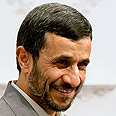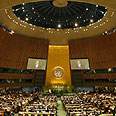

An Iranian official said Sunday that the Islamic republic has increased its production to more than 300 tons of a gas used for uranium enrichment, a semiofficial news agency reported.
The announcement comes as the UN Security Council is deciding whether to impose new economic sanctions against Iran for refusing to roll back its nuclear activities.
"The Isfahan uranium conversion facility is active, and it has produced more than 300 tons of UF6," otherwise known as uranium hexaflouride gas, the Fars news agency quoted Javad Vaidi, deputy of Iran's Supreme National Security Council, as saying in meeting to members of the Revolutionary Guards. The Fars news agency is considered close to the elite branch of Iran's military.
The central Iranian cities of Isfahan and Natanz house the heart of the Iran's nuclear program. In Isfahan, a conversion facility reprocesses raw uranium, known as yellowcake, into uranium hexaflouride gas. The gas is then taken to Natanz and fed into the centrifuges for enrichment.
Centrifuges spin uranium gas into enriched material, which at low levels is used to produce nuclear fuel to generate electricity. But further enrichment makes it suitable for use in building nuclear weapons.
A report by UN nuclear watchdog in November confirmed that Iran had stockpiled nearly 270 metric tons (300 US tons) of the precursor gas used in enrichment.
The UN Security Council has been trying to pressure Iran to freeze uranium enrichment. But Iran has repeatedly refused, and officials from the International Atomic Energy Agency have privately said Tehran is expanding the program.
The Security Council is considering a new draft resolution that calls for additional sanctions against Iran, including bans on travel. Two sets of sanctions have already been imposed on Iran for refusing to halt enrichment.
The five veto-wielding members of the council - the US, Britain, France, China and Russia - along with Germany, agreed last week on the basic terms of the new resolution.
Diplomats have said the full, 15-nation Security Council will likely approve it next month.
Iran insists its enrichment activities are intended only to produce fuel for nuclear reactors that would generate electricity, but the US and others suspect Tehran's real aim is to produce nuclear bombs. A US intelligence report released last month concluded Tehran had stopped its nuclear weapons program in late 2003 and had not resumed it since.
Iranian officials have said they plan to generate 20,000 megawatts of electricity through nuclear energy in the next two decades.















